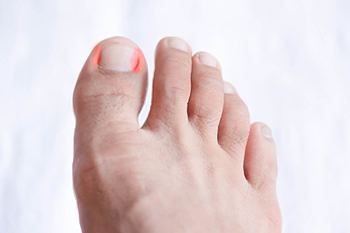
Ingrown toenails can cause significant discomfort, if left untreated. This condition develops when the edge of the toenail grows into the surrounding skin. People often notice redness and swelling surrounding the nail, along with tenderness when pressure is applied. Pain typically worsens when wearing shoes or walking for long periods of time. As the condition progresses, the skin near the nail may become warm and develop drainage or signs of infection. Some people may see pus or feel throbbing pain, especially if bacteria enters the area. The skin may also appear hardened or overgrown along the nail edge. Recognizing these symptoms early can help prevent more serious complications, including deeper infection or abscess. If you notice signs of an ingrown toenail, it is suggested you schedule an appointment with a podiatrist for proper care and appropriate treatment.
Ingrown toenails may initially present themselves as a minor discomfort, but they may progress into an infection in the skin without proper treatment. For more information about ingrown toenails, contact Gerard Skaziak, DPM of Lakeview Family Foot Care. Our doctor can provide the care you need to keep you pain-free and on your feet.
Ingrown Toenails
Ingrown toenails are caused when the corner or side of a toenail grows into the soft flesh surrounding it. They often result in redness, swelling, pain, and in some cases, infection. This condition typically affects the big toe and may recur if it is not treated properly.
Causes
- Improper toenail trimming
- Genetics
- Improper shoe fitting
- Injury from pedicures or nail picking
- Abnormal gait
- Poor hygiene
You are more likely to develop an ingrown toenail if you are obese, have diabetes, arthritis, or have any fungal infection in your nails. Additionally, people who have foot or toe deformities are at a higher risk of developing an ingrown toenail.
Symptoms
Some symptoms of ingrown toenails are redness, swelling, and pain. In rare cases, there may be a yellowish drainage coming from the nail.
Treatment
Ignoring an ingrown toenail can have serious complications. Infections of the nail border can progress to a deeper soft-tissue infection, which can then turn into a bone infection. You should always speak with your podiatrist if you suspect you have an ingrown toenail, especially if you have diabetes or poor circulation.
If you have any questions, please feel free to contact our offices located in Guntersville and Albertville, AL . We offer the newest diagnostic and treatment technologies for all your foot care needs.
